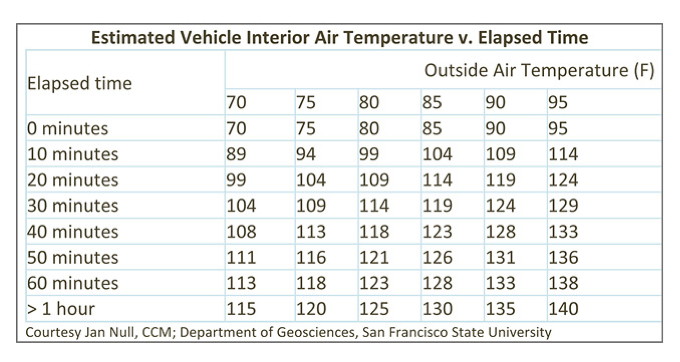By Dr. Lamar, Associate Veterinarian
It’s starting to feel pretty warm outside, time to say hello to summer! As the weather heats up, it’s time to consider ways to cool our pets down. Every year hundreds of pets, mainly dogs, suffer from heat stroke – so it is important to know the correct way to handle the situation.
First of all, heat stroke is an increase in body temperature due to an overly hot external environment and the inability of the body to dissipate that heat quickly enough. It is NOT the same as having a fever, which is caused by internal factors. The techniques used on pets for heat stroke should NEVER be performed at home on an animal with a fever from illness.
When we are hot, the most common reaction from our bodies is to sweat, thus allowing us to dissipate excess heat. Sweating is a very effective method for humans because we have sweat glands nearly everywhere on the body, however, we must keep in mind that our pets have relatively few sweat glands. Dogs are only able to sweat a little bit through their paw pads, which does not get rid of a lot of heat. When they need to dissipate heat, their most effective way is via panting. This is especially important to remember if you have a short-snouted canine (ex. pug, shih tzu, bulldog, etc.) since they are unable to pant as effectively due to their conformation.
Any animal may experience heat stroke, but it is much more likely to occur if it is very hot and/or humid outdoors, he/she has a short snout or is overweight, no water is available, your pet has a heart condition, or if he/she has a thick hair coat. (Side note: it is not advised to clip pets that have a “dual” hair coat, for example huskies, as the special design of their dual coat actually dissipates heat better when intact than when clipped.) The two most common situations in which dogs have heat stroke are when they are trapped in a hot location (usually a car) or when they are outdoors exercising on a warm day. It is never advised to leave your pet in the car unsupervised; even with the windows cracked the interior of a car can easily reach over 100 degrees when it is only 75 degrees outside (see chart above).
In the beautiful summer weather many of us spend more time playing outside with our canine companions – and they adore it! We encourage exercise and play, but we must keep a close eye to ensure they are not overexerting themselves. Dogs are not good judges of when they have “had enough” and they can run themselves right into a heat stroke. If you are outside playing or running with your pet, just think of yourself doing all the same activities…but in a fur coat. On warm days make sure you pack enough water for your furry friend – they will need about twice as many water breaks as you. And never push them onwards if they seem to be slowing down or are not used to that amount of exercise.
Signs that your pet may be experiencing a heat stroke include extreme lethargy or weakness, panting, feeling hot to the touch, very red gums, fast heart rate, vomiting, diarrhea, stumbling, tremors and/or inability to walk. If you are suspicious your pet is experiencing heat stroke, give us a call at 301-258-0333 immediately! We may recommend offering water or placing a cool towel on your pet on the way to the clinic, but check with us first before performing these interventions. It is NEVER indicated to place your pet in an ice bath to treat a heat stroke – this action will actually make your pet worse.
Timing is crucial in these cases as heat strokes can cause severe damage to every organ in the body – mainly on the heart, brain, and kidneys. In the hospital, treatment begins immediately with gentle cooling, fluid therapy, supplemental oxygen, and an assessment of organ function. Hospitalized supportive care is critical for these patients, and unfortunately even with proper care the prognosis is guarded for a pet who is already having a heat stroke.
If you have any concerns about your pets exposure to heat or just have questions about how much outdoor activity your pet may be able to handle, please call us at 301-258-0333 for an appointment today!
Pet Dominion Wants to Know: What would you do if you saw a pet trapped in a car on a warm/hot day? Have you ever experienced this while out and about? How did you react? Leave us your stories in the comments!
